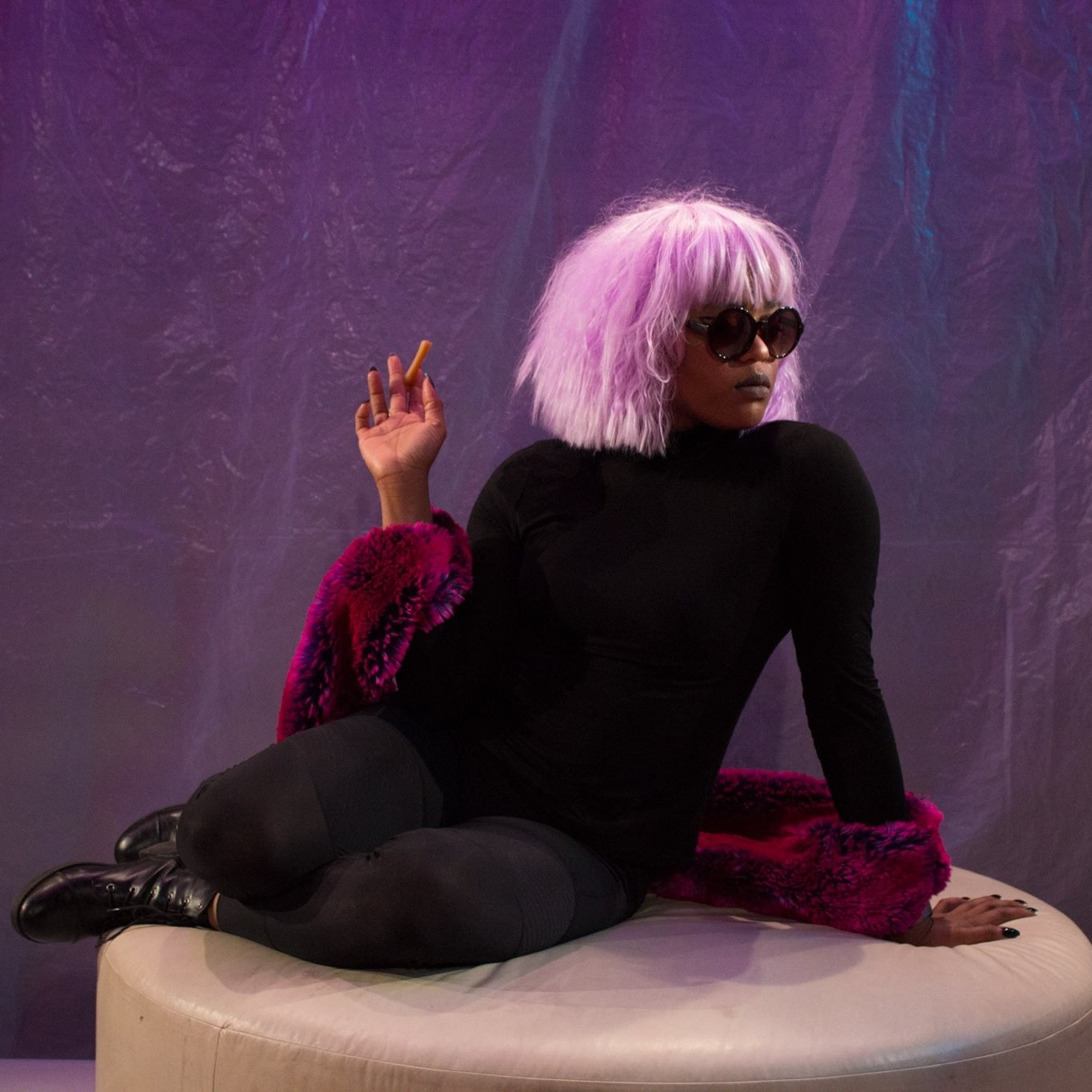Review of Fuck Her, Yale Cabaret
The premise of Fuck Her, a comic take on the politics of procreation by third-year Yale School of Drama playwright Genne Murphy, is that, in the not-so-distant future, once genetically-designed babies are the norm, a clientele will form for reproducing “the old-fashioned way.” You know, like your parents most likely did.
To provide that exclusive sexual service is The Surrogate (Antoinette Crowe-Legacy), a grand dame of an entrepreneur selling a specialized brand: whatever her client wants her to be. And that means that Costume Designer Beatrice Vena gets to create a dizzying array of looks for Crowe-Legacy, who plays each to type with mercurial savvy. Those more versed in the iconography of music videos will no doubt spot some deliberate allusions.
The Surrogate (Antoinette Crowe-Legacy) (photos by Brittany Bland)
Or perhaps the reference point should be cheesy sci-fi movies because that’s how the cast plays it. I couldn’t help thinking of Plan 9 from Outer Space, the infamous sub-B movie by Ed Wood, because of the numerous times someone or something is called “stupid.”
The Surrogate is aided in her birthing business by two children she genetically engineered to serve her—Sky (Chris Puglisi), the elder, and acting often like a demented maître d’, and Star (Moses Ingram), a suitably attired minion who tends to pout and whine. These kids should be at the infancy stage, but—such are the powers of future technology—they’ve been fast-tracked to teen years. The kids get into sibling rivalry (I suppose the gene for that attribute is beyond science) and, eventually, Star sets about sabotaging what she realizes is a con. Sky is more apt to play along, no matter what, clearly engineered to do well in corporate. Star is into oedipal drama, the female version.
The comedy with the kids is cheeky and quirky because Puglisi and Ingram are having so much fun. The clients are a more mixed bag, if only because one would like to see more ingredients in their theatrical DNA (or, is it fair to expect depth in broad caricature?). For my money, Patrick Young comes off best as an insufferable German artiste called Milo, while Laurie OM gets the best costume as Helen, then there’s Carl Holvick as Chip, who, as the name suggests, is just your basic whitebread, me-first, alpha male.
foreground: The Surrogate (Antoinette Crowe-Legacy); background: Helen (Laurie OM), Milo (Patrick Young), Chip (Carl Holvick)
But wait, you ask, how can one woman be a sex-partner/surrogate mother to produce the child of more than one man or male-identifying person at once? Ha ha, fools! Now you see the dastardly plan. While these self-serving egotists think they’re buying exclusive bragging rights, they are in fact allowing The Surrogate to “pollute” their progeny with her genes of choice, thus “undermining” the eugenics of those who might like to do away with undesirable traits. There may be a bit of “power to the people” ethics in the Surrogate’s imperious “fuck them” to these sleazy elitists, but it’s hard to be on the side of someone who makes Joan Crawford look like Mother of the Year. It is fun to see a pregnancy suit deployed though.
In case we miss how abstruse the science behind social and racial manipulation by biological means is, we have Cody Whetstone, who also directs, on hand as a professor in our day to provide an intro and a Q&A session. During the latter, Whetstone, while downing a banana cream dessert, enacts well the intellectually-superior insouciance of those for whom such matters are mostly an academic question.
The humor is very stagey, with the kind of over-the-top readings one tends to find in zany skit comedy, which may or may not provoke the laughs it intends. During the performance I saw, the raucous laughs of a particular audience member, who also provided a planted question during the Q&A, made me wonder if I was experiencing a “live laugh-track.”
Amidst the laughs is the uneasy question of what happens when those for whom “self-determination” is a sign of freedom from what were once assumed to be biological and cultural norms find they can design the people of tomorrow to realize their wildest fantasies. Kind of like reproducing as your favorite computer avatar. But since, by then, we’ll all mostly be living in virtual reality anyway—freed of the declining world of biodegradable, i.e. mortal, beings and things—it probably won’t matter much. O brave new world that lacks such creatures in it!
It all reminds me of that old radio song in my childhood, “In the Year 2525”: “won’t need no husband, won’t need no wife/you’ll pick your son, pick your daughter too/from the bottom of a long glass tube, whoa whoa.”
Fuck Her
By Genne Murphy
Directed by Cody Whetstone
Co-Producers: Al Heartley & Laurie OM; Dramaturg: Sophie Siegel-Warren; Scenic Designer: Riw Rakkulchon; Costume Designer: Beatrice Vena; Lighting Designer: Krista Smith; Projection Designer: Christopher Evans; Sound Designer: Megumi Katayama; Technical Director: Valerie Tu; Stage Manager: Cate Worthington; Assistant Scenic Designer: Lily Guerin; S.E.X. Commercial by Erin Sullivan and Brittany Bland
Cast: Antoinette Crowe-Legacy; Carl Holvick; Moses Ingram; Laurie OM; Chris Puglisi; Cody Whetstone; Patrick Young
Yale Cabaret
November 16-18, 2017
The Yale Cabaret is dark this coming week—Thanksgiving weekend—but returns November 30-December 2 with (the feels)…kms by second-year playwright Jeremy O. Harris, directed by Ari Rodriguez. “KMS” is acronym-speak for “kill myself,” as in: if I don’t make it to the next Cab show, kms.







